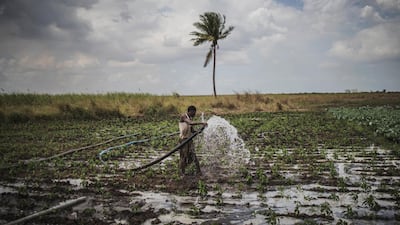The UAE government, state-controlled entities and major private sector enterprises will scale up investments into Africa next year as the continent prepares to roll out a pan-African trade treaty, the co-head of Africa and Middle East global banking business at Standard Chartered said.
The UAE's public and private firms, which have traditionally looked to invest more in Europe and Asia, are now focusing attention on Africa and the level of investment is expected to rise sharply in the next few years, Saif Malik told The National in Dubai.
Standard Chartered, he said, has seen increased capital flow into Africa and the lender expects further momentum in 2020, based on the discussion it is engaged in with clients in both Africa and the UAE.
“It wasn’t an important market [for the UAE] for a while, but now, especially for me in my role in the last 12 months, the amount of interest that I’m seeing from our UAE clients [for African investment] is unbelievable,” Mr Malik said.
“I think it [investment] is going to be probably at some record level, especially, from what I’m hearing in terms of discussion that are happening at government-to-government level.”
Mr Malik, who oversees the bank's business with large multinationals that come to African markets from Europe, the US, Japan and elsewhere, also deals with large African family groups and does advisory work with sovereigns. He was recently in the UAE meeting government-related entities and major private sector firms and sees the UAE becoming a “player” in the African investment scene next year. He also expects state-owned enterprises to join the fray as well.
Africa, regarded as the world's last frontier of growth, has a population of about 1.3 billion and is home to major economies such as South Africa and Opec members Nigeria, Gabon, Algeria and Congo. Africa’s economy is forecast to accelerate to 4 per cent this year, and 4.1 per cent in 2020, slower than India and China, but faster than other emerging and developing countries, according to the African Development Bank.
Africa offers investment opportunities across sectors as countries look to modernise their infrastructures. Energy, renewables, health care, education, agriculture, rail and roads, airports, trade and logistics zones are some areas open to investment. Several African countries are also trying to improve their oil and gas infrastructure and broaden their industrial bases.

AfDB estimates the continent’s infrastructure needs alone are between $130 billion (Dh477.1bn) to $170bn a year, with a financing gap of $67.6bn to $107.5bn.
UAE-to-Africa trade with sub-Saharan African countries was estimated at about $22bn in 2018, making the UAE Africa’s fifth-largest trading partner behind Europe ($155bn), China ($120bn), India ($60bn) and the US ($38bn), according to a Standard Chartered report. The UAE is also among the top 10 source countries for foreign direct investment in sub-Saharan Africa, according to a white paper released by Dubai Chamber and Economist Intelligence Unit in November.
Improvements are being made to intra-Africa trade through agreements such as the East Africa Economic Community and Single African Air Transport Market but the most important is the Africa Continental Free Trade Area (AfCFTA), which will be the world's largest free trade area by number of countries once it’s fully up and running.
After years of talks, the African Union has launched the operational phase of the treaty, whose goal is to establish a single market for goods and services across 54 countries, allow the free movement of business travellers and investment, and create a continental customs union to streamline trade and attract long-term investment. Intra-Africa trade is estimated at $159bn in 2018, according to Afrieximbank's African Trade Report reported released in June this year.
Mr Malik does not think AfCFTA will be ready by 2020, but said that UAE firms are setting the groundwork, building relations and getting to grips with a market that still presents some challenges.
Interest is coming from large private enterprises, especially retail and consumer sector companies and commodities-led groups, he said.
“I think it is a mix of commodities and consumer side. Everyone wants to know [about Africa]. Everyone wants to see what they can do there,” he noted.


